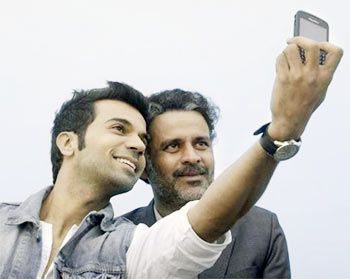 Manoj Bajpayee gives his character a lot of soul and sensitivity in Aligarh, feels Sukanya Verma.
Manoj Bajpayee gives his character a lot of soul and sensitivity in Aligarh, feels Sukanya Verma.
In Tom Ford’s A Single Man, a college professor tells his class how 'a minority is only thought of as one when it constitutes some kind of threat to the majority -- a real threat or an imagined one. And therein lies the fear. If the minority is somehow invisible, the fear is much greater. That fear is why minority is persecuted.'
His choice of words may be broad but what he’s alluding to is specific. The reason he understands this fear so well is because he’s targeted by it for being in minority, for being homosexual.
The professor in Hansal Mehta’s Aligarh is nothing like A Single Man’s in temperament but the aforementioned words resonate the core of his equally lyrical narrative.
Adapted for screen by editor and writer, Apurva Asrani, Aligarh tells the true story of Dr Ramchandra Siras, a Marathi professor and poet in Aligarh University. (They’ve dropped Muslim from the institute’s name to, presumably, avoid unnecessary attention. Also that’s Bareilly College passing off as AMU.)
Few months short of his retirement, Siras becomes the subject of a sting operation -- wherein he’s videotaped making love to a young rickshawwallah -- conducted by self-appointed moral guardians of a society that believes it is entitled to expose and shame what they deem as inappropriate and corrupting. That could be the work of insecure colleagues is also speculated and insinuated like a lot of many other things in the film.
Scandal and suspension is what he gets in place of sympathy.
Mehta understands the damage such occurrences can do to one’s psyche. 'A part of me has died with this incident,' he told Rediff.com after he was attacked by a mob in his office in 2001. He captures Dr Ramchandra Siras’s horror, humiliation and alienation with a brutality that’s more internalised that obvious.
Instead of always singling out his sexuality, Mehta and Asrani focus on the individual. Even as a striking Ashish Vidyarthi and Gauri Balaji passionately fight for and against Siras in court, Aligarh is concerned with the aftermath of a dreadful episode, the scars it leaves on an evasive poet, the stifling confinement of a man ill at ease. He walks around as though carrying a massive burden, one of concealing his natural identity perceived as an oddity by those who don’t subscribe to it.
If he appears self-aware, it is because he is. He can see through the prejudices and prefers to stare in oblivion or look away.
Was he always like that? We aren’t told.
But the sadness engulfing his saggy eyes and wiry grey hair and the manner in which he clings to his briefcase, like a child tugging his teddy bear for comfort, gives away a history of melancholy.
Manoj Bajpayee holds back his intensity a great deal to project the ordinariness of Siras but gives him enough soul and sensitivity to hold up as the dominant point of great injustice. Although there are times I found his representation a tad reductive and repetitive, relying too much on Siras' love for Lata Mangeshkar and whisky. The latter’s closeness to his nephews is implied but never depicted. I cannot claim to know him as well as I would have liked to. But I sure interpreted his silences like he would a poem.
Aligarh, the city known for its locks and Siras, who uses quite a few of them to keep communication at bay, finds its key in a pitch-perfect Rajkummar Rao’s inquisitive journalist Deepu Sesbastian. He’s the sort of motivated reporter who will ineptly blurt out the first thought that pops in his head without taking a moment to filter it. It’s the sort of effortless honesty that earns him his reticent interviewee’s trust and, eventually, friendship.
Mehta shoots Aligarh’s nights in hues of honey-yellow even as days are filled with scenes of dusty streets, dilapidated flax yellow walls and kitschy upholstery that finds a lot of love in small-town abodes.
The pace is unhurried, the background score is minimal, and Aligarh’s mood is often dry or distant. And that’s why the fleeting comedy around Rao’s landlady appears like scenes from another movie.
In Hindi cinema, where homosexuality is an object of derisive gags or caricature, the portrayal Aligarh offers is refreshing and respectful. But it’s much too multifaceted, at times for its own good, to be acknowledged for just that.
Rediff Rating: 











 © 2025
© 2025